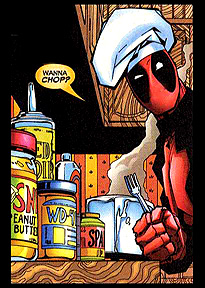|
THE ANSWER TO YOUR FIRST QUESTIONS IS
SHADDUP
deadpool
Around issue #37 it finally occurred to me: it was okay to make
Deadpool look stupid. That was a huge revelation for me: my
entire career, I was taught that the hero must never become the
subject of ridicule. But, Deadpool is insane. Possibly too
insane to realize he's acting foolishly. I could write Deadpool
more like Bugs Bunny: a perpetrator and instigator who was also
a free spirit and totally unflappable. Finally, Deadpool- my
Deadpool and not my parroting of Kelly's- took form.
Deadpool was not my finest hour. There are a litany of whiny explanations I could run through, but the short answer is: I wasn't the right guy for the job. Created by Fabian Nicieza, Deadpool had gone through several interpretations but the most enduring was that of high profile writer Joe Kelly. For all practical intents and purposes, DEADPOOL was Joe Kelly in much the same way the current incarnation of BLACK PANTHER is me. I worried a lot about stepping into Joe's slot, and knew there'd be a great migration of DEADPOOL's very few readers after Joe left.
I was tapped by Editor Ruben Diaz because he and I had a good
relationship, and he knew I had a sense of humor. But, humor can be
very subjective: Joe's humor played off of the sensibilities and
expectations of the hard-core fans; people who knew the history of even
obscure characters in unnerving detail. My humor attacks those
expectations; it works against the polarity DEADPOOL operated on for three
years.
Arriving on the book, I was sent a near complete run of Kelly's DEADPOOL,
including a primer called Encyclopaedia Deadpoolica. Incredibly,
while ED outlined most every adventure Pool had, never bothered to include
a simple explanation of who Deadpool was and how he came to be. I found
Joe's issues to be complex and a little hostile to new readers, like me,
who were struggling to get on board.
While I was coming up to speed, I leaned heavily on my editor, who should,
by all rights, be Marvel's resident expert on Deadpool. This invited
heavy-handed participation in the writing process that yielded some fairly
idea-starved issues and continuity gaffes.
 I was also paired with an artist who used extreme proportions and had not
much of a sense of storytelling- which is critical for a book like
Deadpool. None, not a single one, of my sight gags worked, and
complex sequences (like the ambulance chase in #36) were hopelessly
muddled. There was also, apparently, a language barrier between the
artist and myself, and important details (like the difference between The
Green Goblin and the Hobgoblin) were flubbed.
I was also paired with an artist who used extreme proportions and had not
much of a sense of storytelling- which is critical for a book like
Deadpool. None, not a single one, of my sight gags worked, and
complex sequences (like the ambulance chase in #36) were hopelessly
muddled. There was also, apparently, a language barrier between the
artist and myself, and important details (like the difference between The
Green Goblin and the Hobgoblin) were flubbed.
Things started to turn around with issue #37, a fill-in by former Aquaman
artist Jim Calafiore. As I was writing that story, it finally occurred to
me: it was okay to make Deadpool look stupid.
That was a huge revelation for me: my entire career, I was taught that the
hero must never become the subject of ridicule. But, Deadpool is insane.
Possibly too insane to realize he's acting foolishly.
I could write Deadpool more like Bugs Bunny: a perpetrator and instigator
who was also a free spirit and totally unflappable. Finally,
Deadpool- my Deadpool and not my parroting of Kelly's- took form, and
Jim delivered a memorable issue #37 where Deadpool is found worthy of
lifting Thor's hammer, and becomes Beta Ray Wade.
Inexplicably, the editor chose to use neither the image of Beta Ray Wade
lifting the hammer, nor the name "Beta Ray Wade" on the cover,
and this watershed issue (for me, anyway) became yet another missed
opportunity.
By the time the new editor arrived, I was in the middle of a fatally
undercooked space opera that I didn't want to do, but Roo had had in mind
from the moment I came on board. Not a week went by when he didn't
pester me about doing, "the Dirty Wolff story." Doing the
space story was a thank-you to the exiting Roo, but the incoming editor
was chagrinned by the wrongheadness of the story.
The only thing I think I did well on the book was actually Ruben's idea: Seinfeld
with Super-Villains. Ruben picked Titania and Constrictor (apparently
without clearing this with anyone), and had me move 'Pool into a condo
with them. Of course, the same issue we established this new status quo,
Roo inexplicably shot 'Pool into space, separating him from his new
supporting cast.
Some of the best moments of my run actually involve the mundane daily
doings of super-villains, a theme I hope to revisit soon. But, by the time
the new editor arrived, we were both looking for the exits. DEADPOOL
had become an enormous drain, an uphill battle to write. I wanted to work
on something that didn't have an editor all but typing my stories for me,
and the new editor wanted to change the downward sales spiral.
Nobody ever said, "You're fired," so, it's possible I
quit. Or, maybe I just saved the guy (a friend from Acclaim I
lobbied for and continue to support at Marvel) the trouble of making a
painful call. Either way, I think we were both relieved to be out of
the Deadpool. I was the wrong guy, it was a bad call. I hope the book
continues and finds great success, and I hope Joe Kelly, wherever you are,
can forgive me.
Christopher J. Priest
September 2000
The White Envelope Is Trash
|